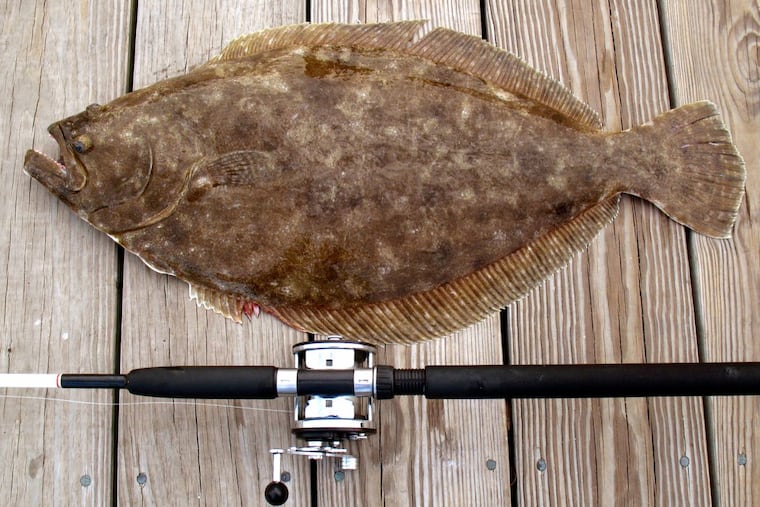N.J. flounder, sea bass pushed north because of climate change, say scientists
Climate change is causing a profound shift in the habitats of many species of fish, including the flounder found off the New Jersey coast, and setting the stage for potential conflict between fishing regions, according to new research.

Continued ocean warming could cause habitats of many species of fish, including flounder and black sea bass, regularly found off New Jersey's coast, to move much farther north with the potential to alter fisheries and challenge commercial fishing operations, new research has found.
"Our study suggests that climate change will force hundreds of marine animals to shift north, including some of the species most important right here in the Mid-Atlantic," said Malin Pinsky, a biologist and Rutgers University professor in the department of ecology, evolution, and natural resources. He is a co-author of the Rutgers-led study, published last week in the journal PLOS ONE. The study was supported by the National Oceanic and Atmospheric Administration.
Pinsky said the habitat for black sea bass already is moving north. But, he said, it is projected to migrate 300 miles farther north by 2100, according to the study. The black sea bass has a large range and roams to locations depending on its life cycle. The fish spawns from May to July anywhere from Montauk Point on Long Island to the Chesapeake Bay.
Pinsky said other species, such as summer flounder, also are projected to shift north. He said he was "surprised" by the amount of projected shifts — as much as 600 miles for many species. In some cases, the projected shift was 1,100 miles.
The researchers aren't saying sea bass and flounder would no longer be found off areas such as the New Jersey coast, but their main habitats could move, forcing fishing operations to roam farther, spending more time at sea, and burning more gas.
To derive their findings, researchers examined historical data from 136,044 ocean-bottom trawls from around the United States and Canada, with some dating to 1963. They looked at habitat models for 686 marine species in the Atlantic and Pacific Oceans and ran future models based on various greenhouse gas scenarios.
NOAA data show long-term warming trends off the mid-Atlantic coast, with temperatures rising at the surface by about 2 degrees over the last three decades. The study's researchers predict additional ocean temperature rises of 2 to 4 degrees by 2100. Fish are highly sensitive to even small temperature changes.
States and regions have agreed-upon quotas for the amount of various fish species fishing operations can keep. The quotas are based on where the fish were traditionally brought to land. But the migrations are already starting to upend fishing grounds, setting off a complex chain of economic events, which could culminate in the displacement of some fishing operations.
"Our results contribute to a growing body of work that stresses the importance of the level of global warming for the magnitude of changes in living marine resources by the end of this century," the authors stated.
But dramatic temperature shifts can be avoided if emissions are curtailed to the level specified by the Paris Agreement, the authors said.
The West Coast and Gulf of Alaska face some of the biggest potential shifts, according to the Rutgers research. But the Northeast also has potential to see considerable movements among species.
Massachusetts congressional delegates have already pushed for changes in fishing quotas for many species caught by New England operations. They have lower quotas for some fish they are now seeing an abundance of in local waters — especially black sea bass, summer flounder and scup. So, even if a fishing operation's nets haul in an abundance of those fish, it may have to release them.
At the same time, fishing operations from mid-Atlantic states have been forced to venture farther north from traditional fishing grounds, bringing them into competition with New England vessels. The longer trips also mean higher fuel costs. It could also mean changes in how fishing operations purchase permits.
Tina Berger, a spokeswoman for the Atlantic States Marine Fisheries Commission, said the new research is not just academic, as states are already witnessing the shift. The commission, which has representatives from a number of states, coordinates management of 27 fish species.
Lobsters have been among the species most impacted, Berger said, because they cannot simply swim to another location when the temperature of the water changes, so they cannot reproduce and thrive.
"Certainly, there's acknowledgment that it's happening," Berger said. "We are looking at how to address it. In some cases, fisheries have had to be closed for northern shrimp. In other cases, fisheries have been scaled back, as in New England lobster. We need to look at exploring other ways of allocating our resources that are based not only on traditional landing locations, but as to how the fisheries are changing."
As for New Jersey, fishermen can still look forward to good catches. James Morley, another scientist on the study, said that the mid-Atlantic region, will still see habitat suitable for many species and even increases for some because of warmer water. But most of those same species are also projected to shift further into the New England region and as far as the Gulf of Maine.
Some species, however, including Atlantic Mackerel and Spiny Dogfish, are projected to decline off the New Jersey coast.